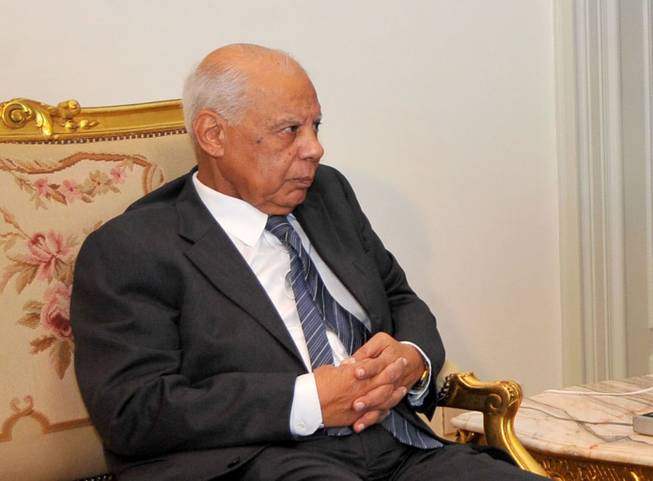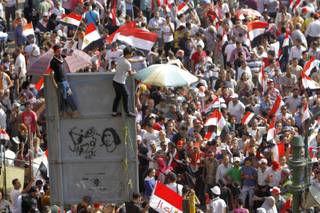
Egyptian Presidency / AP
In this image released by the Egyptian Presidency, Hazem el-Beblawi meets with interim President Adly Mansour, unseen, in Cairo, Egypt, Tuesday, July 9, 2013. The spokesman of Egypt’s interim president says a prominent economist, Hazem el-Beblawi, has been named prime minister and pro-democracy leader Mohamed ElBaradei as a vice-president.
Tuesday, July 9, 2013 | 12:49 p.m.
CAIRO — After days of deadlock, Egypt's military-backed interim president named a veteran economist as prime minister on Tuesday and appointed pro-democracy leader Mohamed ElBaradei as a vice president, while the army showed its strong hand in shepherding the process, warning political factions against "maneuvering" that impedes the transition.
The appointment of Hazem el-Beblawi as prime minister came soon after the interim leadership issued a timetable that sets a fast track for amending the constitution and holding elections for a new parliament within seven months, followed by a presidential election.
The moves — and the statement Tuesday by military chief Gen. Abdel-Fattah el-Sissi — showed the determination to entrench a new political system in the face of an campaign by Islamists to reverse the military's July 3 ousting of President Mohammed Morsi. The military removed the country's first freely elected president last week after four days of massive protests by millions of Egyptians demanding he go.
Morsi's Muslim Brotherhood denounced the transition plan, saying it brings the country back to "zero" in the political process and vowed to continue street protests demanding Morsi's reinstatement. A day earlier, more than 50 Morsi supporters were killed by security forces in clashes outside a military installation, heightening the country's polarization between Islamists and their opponents.
Arab countries of the Gulf, which were largely opposed to the Brotherhood's power in Egypt, quickly moved to back the new leadership with promises of help for its economy, wrecked by 2 ½ years of turmoil since the ouster of autocrat Hosni Mubarak. On Tuesday, the United Arab Emirates pledged $3 billion in grants and loans to Egypt's new government.
The naming of a prime minister was seen as a key step in moving ahead in the political process, but it had been deadlocked for days in negotiations between liberal, secular and youth factions and the sole Islamist party that backed Morsi's removal, which blocked several of their candidates.
El-Beblawi, 76, called for dialogue between the new leadership and their Islamist opponents. "Everyone in Egypt must sit together on the table for dialogue to solve current political differences, stop violence and bloodshed in the street," he told The Associated Press.
El-Beblawi served as finance minister in one of the first cabinets formed after Mubarak's ouster and military stepped in to rule for 18-month transitional period. He resigned in protest in October 2011 after 26 protesters, mostly Christians, were killed by troops and security forces in a crackdown on their march.
He is one of the founders of the Egyptian Social Democratic party, one of several secular parties in the liberal grouping National Salvation Front. The Front had backed youth activists who drove the massive protests against Morsi and brought down his rule thanks to military intervention.
Liberal, secular and youth factions have been trying to ensure one of their own in the spot, but collided with the ultraconservative Salafi Al-Nour Party. Last week, ElBaradei was on the verge of being named prime minister, but at the last minute he was withdrawn in the face of Al-Nour objections. An ally of ElBaradei was then touted as a compromise, but the Salafis again expressed disapproval.
ElBaradei is considered one of the strongest pro-reform figures, but many Islamists vehemently oppose him, considering him too secular.
Soon after el-Beblawi's appointment was announced by the spokesman of the interim president, military chief el-Sissi issued a statement telling factions not to engage in political "maneuvering" in what appeared to be a veiled warning to Al-Nour.
"The future of the nation is too important and sacred for maneuvers or hindrance, whatever the justifications," el-Sissi said in a statement carried by state-TV.
A spokesman for Al-Nour, Ibrahim Abaza, told AP that the group welcomes el-Beblawi's appointment.
The quick moves on a transition also likely aim to show the United States and other Western nations that the country is moving quickly back to an elected civilian leadership. Washington has expressed concern over the removal of Egypt's first freely elected president, and if the U.S. government determines that the army's move qualifies as a coup it would have to cut off more than a $1 billion in aid to Egypt, mostly to the military. The Obama administration has said doing so would not be in U.S. interests.
After Monday's bloodshed, both the Brotherhood and the military appeared dug in in their standoff. The military accused armed Islamists of sparking the fighting by attacking the headquarters of the Republican Guard. Morsi supporters say no such attack took place and that troops attacked their sit-in nearby, opening fire on them without provocation after dawn prayers. Along with 51 protesters, an army officer and two policemen were killed.
Since the deaths, the military and allied media have depicted the campaign to restore Morsi as increasingly violent and infused with armed extremists.
An Egyptian security official said 650 people were arrested, most during Monday's violence, for allegedly trying to storm the Republican Guard headquarters. The military claims that is what sparked the violence that led to the deaths. Protesters and Morsi's Muslim Brotherhood deny any attack took place, saying the troops descended on their sit-in outside the headquarters and started firing.
The official said there were Syrian and Palestinian nationals among those arrested — an apparent attempt to portray the sit-in as including foreign militants. The official spoke on condition of anonymity because he was not authorized to talk to the press.
Islamists, in turn, have talked of the military aiming to crush them after what they say was a coup to wreck democracy.
Essam el-Erian, a senior Brotherhood figure and deputy head of its Freedom and Justice Party, rejected the transition timetable, saying it takes the country "back to zero."
"The cowards are not sleeping, but Egypt will not surrender. The people created their constitution with their votes," he wrote on his Facebook page, referring to the constitution that Islamists pushed to finalization and then was passed in a national referendum during Morsi's year in office.
He said the military and its allies were targeting "not just the president but the nation's identity, the rights and freedoms of the people and the democratic system enshrined in the constitution."
The constitution passed under Morsi — and suspended since his fall — was written by an assembly created by the first post-Mubarak parliament, elected in 2011-2012. But the panel was deeply controversial.
Reflecting the parliament, the constituent assembly had a strong Islamist majority. Most non-Islamists eventually abandoned the assembly, complaining that the Brotherhood and its allies were imposing their will. Courts were considering whether to dissolve the panel but Morsi unilaterally decreed that they could not while his allies rushed to finalize the draft.
The final version had a strong Islamist flavor, deepening requirements for laws to abide by Shariah. The document passed in a referendum with around 60 percent of the vote — but only around 30 percent of voters casting ballots.
Under the timetable issued Monday by interim president Adly Mansour, two appointed panels would be created.
One, made up of judges, would come up with amendments. The other, larger body consisting of representatives of society and political movements would debate the amendments and approve them.
The new constitution would be put to a referendum within 4 ½ months from now.
Elections for a new parliament would be held within two months of that. Once the new parliament convenes, it would have a week to set a date for presidential elections.



Join the Discussion:
Check this out for a full explanation of our conversion to the LiveFyre commenting system and instructions on how to sign up for an account.
Full comments policy